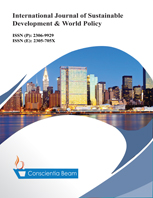The Dynamics of Land Market and Food Security in Malawi
Abstract
This study analyzes factors associated with land rental market and its implication on food security in rural households of Malawi. Land rental markets transfer land from land rich but resource poor to land poor but wealthy households. It is also a remedy to scarcity of land due to soaring population growth and hence high pressure on farm land. A binary probit model was applied for participation, and censored (Tobit) for degree of participation for both tenants and landlords to pin down socio-economic factors affecting the land rental market using 450 randomly sampled households across six districts. Treatment effect model was used to test whether land market participation improves food security of the participants. After controlling for soil characteristics and agro ecological factors, the study revealed that rental participation has significantly improved the tenant’s food access in terms of staple food (maize) but has no positive significant effect on the landlords’ maize output.

